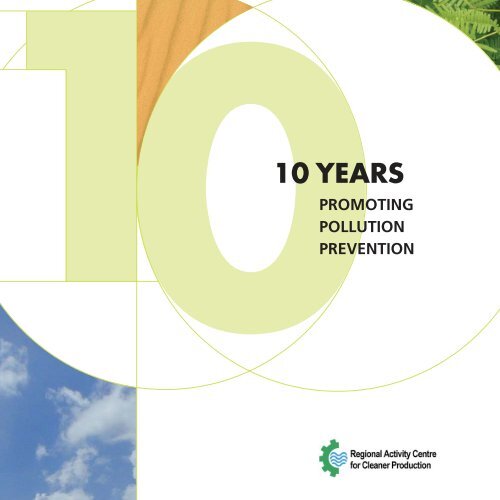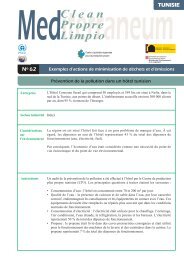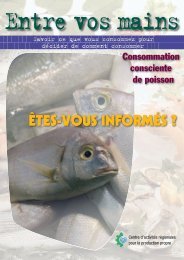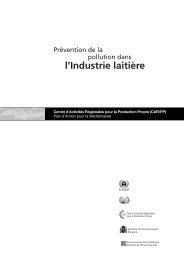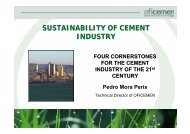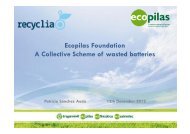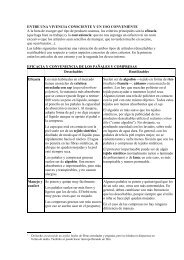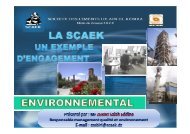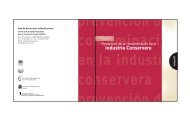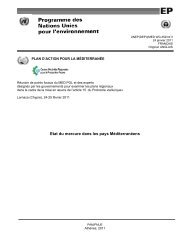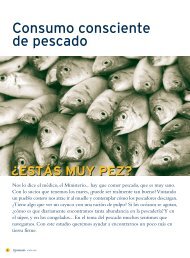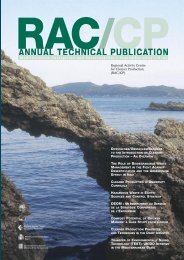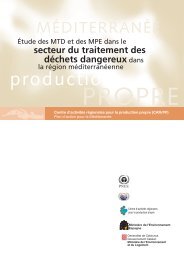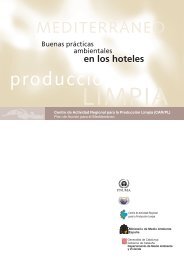English - Regional Activity Centre for Cleaner Production
English - Regional Activity Centre for Cleaner Production
English - Regional Activity Centre for Cleaner Production
You also want an ePaper? Increase the reach of your titles
YUMPU automatically turns print PDFs into web optimized ePapers that Google loves.
10 YEARSPROMOTINGPOLLUTIONPREVENTION
10 YEARSPROMOTINGPOLLUTIONPREVENTION
10 YEARSPROMOTINGPOLLUTIONPREVENTION<strong>Cleaner</strong> <strong>Production</strong> and EcoefficiencyMechanisms <strong>for</strong> promoting the sustainable developmentof the economic and industrial sector in the MediterraneanTraditionally, companies have mainly resorted to end-of-pipe treatments as a measure <strong>for</strong> reducing the environmentalimpact generated by their activity.However, these solutions are insufficient and require investment with no other benefit than simply fulfilmentof environmental regulations.To compete in an international market with increasingly more demanding environmental and qualityrequirements, the Mediterranean economic sector must integrate criteria of ecoefficiency into its decision-makingprocesses that affect the production process as well as its products and services.Adopting alternatives <strong>for</strong> pollution prevention that create business efficiency opportunities with regard tothe use of resources and maintaining control over the environmental impact of the product, from its design untilthe end of its useful life, will contribute to the success of this ef<strong>for</strong>t, improving not only the efficiency but alsothe image of the enterprise against that of its competitors and among the consumers themselves.The existence of a body that promotes dissemination and exchange, both of knowledge as well as of theinitiatives carried out in the various economic sectors of the Mediterranean countries is key <strong>for</strong> promoting theadaptation to the new requirements of competitiveness which include criteria of ecoefficiency in enterprisesof the region.The <strong>Regional</strong> <strong>Activity</strong> <strong>Centre</strong> <strong>for</strong> <strong>Cleaner</strong> <strong>Production</strong> (RAC/CP) with its headquarters in Barcelona acts, withinthe Mediterranean Action Plan (MAP), as an operative unit to promote pollution prevention:- disseminating ecoefficient options and techniques- offering technical support and assessment to regional states and institutions- based on cleaner production as one of the basic tools
<strong>Cleaner</strong> production and ecoefficiency both consist of management strategies that integrate company excellenceand environmental excellence, linking economic growth with environmental improvement, through maximisingthe productivity of the resources and minimising polluting emissions at source. The introduction of alternatives<strong>for</strong> reducing and continually controlling environmental impacts created in productive activities, generates positiveeffects in the socio-labour area of the companies, so that this leads to a reduction in the health and safety risksof workers, associated to the environmental impacts (generation of hazardous waste, pollutant leaks, handlinghazardous substances, etc.)The <strong>Regional</strong> <strong>Activity</strong> <strong>Centre</strong> <strong>for</strong> <strong>Cleaner</strong> <strong>Production</strong> (RAC/CP) takes on the function of a MAP unit <strong>for</strong> thedissemination, promotion, assessment, training and exchange of experiences and knowledge between Mediterraneancountries in matters of cleaner production and ecoefficiency, such as tools through which the economic andindustrial sector of the region advances towards sustainable development.Mediterranean Action PlanA work setting backed by the United Nations Environment Programme (UNEP), in which the countries ofthe Mediterranean Basin agree to work together in the fight against the environmental degradation of theregion. The legal structure of the MAP was <strong>for</strong>malised with the setting up and ratification by the countriesof the Barcelona Convention <strong>for</strong> the protection of the marine environment and the coastal region of theMediterranean.This task is carried out through the following lines of action:1. Training projects and activities.2. Studies into pollution prevention alternatives in sectors of interest to the Mediterranean region.3. Publication and dissemination of news and business experiences.4. Technology transfer and exchange of experts.5. Participation in the activities of the MAP, the Mediterranean Commission on Sustainable Development(MCSD), the application of the Land-Based Sources Protocol and European initiatives.6. Coordination of a network of National Focal Points (NFP) <strong>for</strong> the sustainable development of theMediterranean industry.
The <strong>Regional</strong> <strong>Activity</strong> <strong>Centre</strong> <strong>for</strong> <strong>Cleaner</strong> <strong>Production</strong> (RAC/CP)Created in 1994 by the Department of the Environment of the Government of Catalonia, the <strong>Centre</strong> <strong>for</strong> <strong>Cleaner</strong><strong>Production</strong> Initiatives (CCPI) was created as a specific unit within the Industrial Hazardous Waste ManagementPlan with the aim of promoting the principles of advantages of pollution reduction at source among companies.In 1995, the Catalan and Spanish governments signed a collaboration agreement <strong>for</strong> boosting and promotingcleaner technologies in Spanish industry through the CCPI. That same year, and coinciding with the 9th Meetingof the Contracting Parties to the Barcelona Convention, the Spanish government presented the candidatureof the CCPI to the Mediterranean Action Plan (MAP) <strong>for</strong> it to act as the <strong>Regional</strong> <strong>Activity</strong> <strong>Centre</strong> <strong>for</strong> <strong>Cleaner</strong><strong>Production</strong> (RAC/CP).This offer was accepted at the Extraordinary Meeting of the Contracting Parties held in Montpellier in 1996 andthe <strong>Regional</strong> <strong>Activity</strong> <strong>Centre</strong> <strong>for</strong> <strong>Cleaner</strong> <strong>Production</strong> was created.In 1998, and to be able to carry out its functions better, the CCPI was given its own legal identity on beingdeclared a public limited company with public capital. Two years later, in 2000, a name change was agreed on,and it became the <strong>Centre</strong> <strong>for</strong> the Enterprise and the Environment.The RAC/CP’s work plans were set in the Bilateral Follow-Up Committee, made up of representatives of theSpanish and Catalan governments, taking into account the recommendations of the Contracting Parties to theBarcelona Convention.The ordinary activities of the RAC/CP are funded by the Spanish government. The participation of the RAC/CPin other actions of the MAP and in extraordinary activities is carried out through a mixed system of funding, witha different contribution being agreed on <strong>for</strong> each case.
We are commemorating ten years since the <strong>Centre</strong> <strong>for</strong> the Enterprise and theEnvironment (CEMA) was designated as one of the six <strong>Regional</strong> <strong>Activity</strong> <strong>Centre</strong>s,in 1996, within the framework of the Mediterranean Action Plan of the UnitedNations Environment Programme (UNEP).Each of these centres takes care of a particular thematic area: the main objectiveof the <strong>Regional</strong> <strong>Activity</strong> <strong>Centre</strong> <strong>for</strong> <strong>Cleaner</strong> <strong>Production</strong> (RAC/CP) is the promotionand dissemination in the Mediterranean area of pollution prevention and reductionat source in productive sectors, as well as offering technical support to the institutionalorganisations and, through them, the companies that wish to promote less pollutingand more ecoefficient techniques and practices in their activity.In accordance with the UNEP, we understand by “cleaner production” the continuedapplication of an integrated strategy of environmental prevention to processes,products and services, with the aim of reducing hazards <strong>for</strong> human beings and <strong>for</strong>the environment, to increase the competitiveness of companies and to guaranteetheir economic viability. This means saving on raw materials, water and energy;elimination, reduction and/or replacement of hazardous materials and the reductionof the quantity and hazardousness of waste and polluting emissions.The Mediterranean Basin is a heterogeneous region with a very diverse socio-culturalmosaic, which is the result of its condition as the crossroads of three continents.A diversity which is also evident in the different levels of economic, technologicaland industrial development and in the different degrees of impact of the economicactivities on the environment.It is the basin of a unique, half-enclosed sea, which occupies 2.5 million km 2 . Theterritories occupy 8.8 million km 2 (5.7% of the area of the world) and its population,which is growing and is mainly concentrated in large cities on the coast, is approximately7% of the world population (between 1970 and 2000 it grew from 285 to 470million inhabitants, and it is estimated that in 2025, it will reach 523.5 million). Theindustrial sectors revolve around oil and natural gas, phosphates, steel manufacture,the chemical and petrochemical industries, paper, paints, plastics, leather tanning,textiles and graphic arts, not <strong>for</strong>getting the importance of agriculture and tourism.10 YEARSPROMOTINGPOLLUTIONPREVENTIONAll this diversity, without a doubt, marks the <strong>Centre</strong>’s work and at the same timegives it a broad range of fields in which to act.
With the emphasis on dissemination and the exchange of initiatives carried out bythe various economic sectors of the Mediterranean countries, the <strong>Centre</strong> is key tohelping companies adapt to current competitiveness criteria, which includeecoefficiency criteria. These are criteria that are increasingly more demanding, andthat need to be integrated into decision making.Catalonia is Mediterranean. Most of our population and industrial activities areeither on the coast or spill into Mediterranean river basins that have been intenselyexploited throughout history. This is why the reduction of pollution in the Catalanpart of the common basin is an objective in which we must become involved, bothfrom the various areas of government –Catalan Government and Town Councils–as well as from society in general, and most specifically from companies.One of the most recent expressions of this interest was the celebration of the highlevel meeting in Barcelona to launch the Horizon 2020 initiative, which has as itsobjective to reduce pollution levels in the Mediterranean region and to identify andact on the main sources of pollution, on either side of the basin. This will meannew challenges, new commitments and new human and economic resources tocontinue and extend the programmes to a whole series of activities in <strong>for</strong>thcomingyears, with the very special support of the European Union.These first ten years of the <strong>Centre</strong>’s intense work would not have been possiblewithout the constant interest, help and collaboration of the Spanish Ministry ofthe Environment, shown in successive agreements and most particularly, withoutthe dedication of the management and employees of the CEMA during its differentstages. Work that has meant considerable ef<strong>for</strong>t from the Spanish Ministry of theEnvironment and the Catalan Department of the Environment and Housing in termsof resources and staff, first through the CEMA, and which we hope to increaseeven more from now on through its integration into the Department’s services. Inthis task, the RAC/CP has had, and will continue to have during the new phase,all the support of the Department as well as my own personal support.Francesc Baltasar i AlbesaMinister <strong>for</strong> the Environment and Housing4 May 2006
10 “Ecoefficient” ActivitiesSince 1996, the date of its nomination, the <strong>Regional</strong> <strong>Activity</strong> <strong>Centre</strong> <strong>for</strong> <strong>Cleaner</strong><strong>Production</strong> (RAC/CP) has carried out its activities with the various member countriesof the Barcelona Convention, to facilitate the integration into business managementof economically viable pollution prevention measures adapted to the Mediterraneancontext. The RAC/CP has also collaborated with the Contracting states of the BarcelonaConvention in creating new cleaner production centres and in activities that promotemore ecoefficient production.
Studies on pollutionprevention alternativesPublications analysing the trends and initiatives of theindustries and of the Mediterranean countries towardsan economically and environmentally sustainabledevelopment as well as feasible pollution preventionalternatives.General studiesThey present and analyse matters concerning CPconcepts and sustainable development, in a global wayand at a regional scale.Sectoral studiesThey analyse a certain industrial sector, presenting itssituation and trends in each country of the region,describing its production processes and theenvironmental impacts created and they identify optionsto minimise these impacts and prevent the healthhazards associated to the pollution.Methodological studiesThey present tools to facilitate ecoefficient managementin companies, through the analysis of their productionprocesses, the introduction of the best availabletechniques and good housekeeping practices, to identifysolutions <strong>for</strong> environmental impacts created by theirproduction activity.
Creation of the <strong>Cleaner</strong><strong>Production</strong> <strong>Centre</strong> in Bosniaand HerzegovinaA project <strong>for</strong> capacity building in pollution preventionin Bosnia and Herzegovina. The project, which lasted 3years (2002-2005) and was headed by the CESD (<strong>Centre</strong><strong>for</strong> Environmentally Sustainable Development) incollaboration with the RAC/CP and the Croatian <strong>Cleaner</strong><strong>Production</strong> <strong>Centre</strong> is set in the framework of an initiativeof the European LIFE-Third Countries Programme.The main objective was the creation of a cleanerproduction centre in the country and training throughthe transfer of knowledge, in<strong>for</strong>mation and trainingin methodologies and techniques to enable thecountry’s industry to provide a solution to theenvironmental impacts created by their activity.Among the activities carried out, we should mentionthe interchange of experts and the missions of theinstitutions of the respective countries, training in themethodology of the Minimisation OpportunitiesEnvironmental Diagnosis, the creation of a library andof adapted material <strong>for</strong> dissemination.State of <strong>Cleaner</strong> <strong>Production</strong>in the MediterraneanThe first Mediterranean study that constitutes a sourceof in<strong>for</strong>mation on the trends and activities adopted bythe Mediterranean countries on pollution prevention.The study centres its attention of the level of developmentof cleaner production, taking into accountthe contributions of the Focal Points of the RAC/CP,of other qualified experts and of references fromrelevant institutions in the matter.It is a relevant document that reviews the situationof the cleaner production centres in Mediterraneancountries and in<strong>for</strong>ms about the advances carried outin regulations, agents, plans, programmes and toolsthe countries use <strong>for</strong> their introduction.
Minimisation OpportunitiesEnvironmental Diagnosis(MOED)The evaluation of industrial activity requires apreliminary stage to detect opportunities <strong>for</strong> improvingand optimising processes. Through the MinimisationOpportunities Environmental Diagnosis (MOED),companies look more deeply into the knowledge oftheir activities to detect opportunities <strong>for</strong> pollutionprevention which are, in each case, technically andeconomically feasible.The MOED is a tested methodology applied in morethan 600 Mediterranean companies and which enablesraw materials and resources to be saved with shortpayback periods.Over these ten years, the RAC/CP has created supportmaterial to disseminate this methodology (manualsand CDs in Spanish, <strong>English</strong>, French and Arabic) andhas trained more than 450 technicians in thismethodology in workshops and courses carried outin different countries in the region.<strong>Regional</strong> Plan <strong>for</strong> thereduction of industrialhazardous wastein the MediterraneanA document written to help Mediterranean countriesto develop their National Action Plans in the frameworkof the Strategic Action Programme (SAP). Thisprogramme represents the adaptation of the principlesof the Global Action Programme of the United NationsEnvironment Programme and identifies the mainenvironmental problems of the region to fight againstpollution of a land-based source.The Plan carries out a classification of the main hazardouswaste and proposes a series of actions to be carried outat a regional as well as a national level <strong>for</strong> their effectivereduction.The <strong>Regional</strong> Plan <strong>for</strong> the reduction of hazardous wastewas approved by the Contracting Parties at the 13thMeeting of the Parties (Catania, November 2003).
<strong>Regional</strong> Workshop “Statusand trends of industry andsustainable development”<strong>Regional</strong> Workshop of the Industry and SustainableDevelopment Workgroup of the MediterraneanCommission on Sustainable Development (MCSD)organised by the RAC/CP in Barcelona from 27 to 29June 2001.The meeting brought together more than 60 expertsand technicians in the region to analyse the currentsituation, the trends of the industry in the Mediterraneanwith regard to sustainable development and to discussthe need to integrate industrial activities and the principlesof sustainable development in the regional context.As a result of this workshop a series of recommendationsand strategic and action proposals were suggestedwhich were presented to the MCSD to be elaboratedin the Mediterranean Sustainable Development Strategy.DatabasesIn these 10 years of activity, the <strong>Regional</strong> <strong>Activity</strong><strong>Centre</strong> <strong>for</strong> <strong>Cleaner</strong> <strong>Production</strong> has prepared a databaseof technologies by sector that compiles the variousfeasible alternatives of pollution prevention. Thisdatabase is structured by processes, waste flows andtype of technology.At present, the technologies database has more than250 entrances with in<strong>for</strong>mation about the textile,paper, metallurgy, tanning and surface treatmentsectors and every year new sectors are added.The RAC/CP has drawn up a database of Mediterraneanexperts with a list of more than 150 experts andprofessionals in the region who specialise in pollutionprevention, listing their areas of experience andknowledge as well as their contact in<strong>for</strong>mation.
“Pollution preventionin the UniversityCurricula” ModuleThe universities educate technicians who in the future,as professionals in industries and institutions, will havea definitive influence on company and social behaviour.The universities have, there<strong>for</strong>e, the responsibility tocreate awareness in their students, providing themwith the necessary knowledge and training them inthe practice of management tools, which after all, canmake sustainable development possible.The RAC/CP has developed a specific product <strong>for</strong> theuniversity world; the “Pollution Prevention in theUniversity Curricula” module. This module offersstudents the principles and methodology of pollutionprevention and cleaner production.The module can be used <strong>for</strong> self-in<strong>for</strong>mation or witha teacher as a tutor to direct the students’ learning.Each chapter contains a theoretical part with thecorresponding table of contents and a practical partwhich includes a series of exercises destined to makestudents stop and think. Most of the chapters arecompleted with a proposal of activities to help thestudent pass on to the action.RAC/CP Annual TechnicalPublicationA magazine that brings together scientific andtechnical contributions related to pollution preventionand ecoefficiency, paying special attention to the“Mediterranean” characteristic of its content. This isperhaps what differentiates it from other magazineson the international circuit.The magazine has been designed as a vehicle <strong>for</strong>transmitting knowledge among the Mediterraneanscientific community, technicians and staff in thepublic administrations who work on a daily basis withthe company sectors and the effective reduction ofpollution.It is a work that aims to offer the Mediterranean countriestools and knowledge adapted to the idiosyncrasy, thegeography, the climate, the customs and the needs ofthe technicians in the region, enabling them to advanceon the way to sustainability.
Advanced Workshops –Azahar ProgrammeThe RAC/CP, within the framework of a collaborationprogramme between the Spanish and Catalan CooperationAgencies, carried out training workshops <strong>for</strong> professionaland institutions in the Mediterranean region.Its objective is to generate a real impact on the humandevelopment of all the Mediterranean countries,compatible with the protection of the environmentand the preservation of its natural resources.In these specialised workshops, highly practical andapplied to the context in which the countries in thesouth and the east of the Mediterranean are found,the active participation of those present is promoted,combining theoretical components with case studiesand the exchange of experiences through theorganisation of round tables, debates and presentationsof lessons learned. The objective is to achieve a poolof shared interests and the drawing up of joint finalconclusions.The workshops organized to date have covered diversethemes (tanning, the dairy sector, waste management,etc.).
Who is the RAC/CP?From left to right and from top to bottom:Enrique Villamore, Esther Monfà,Mar Santacana and the Director, Virginia AlzinaThe next stepsRecently the Mediterranean Strategy <strong>for</strong> Sustainable Development(MSSD) was approved by the Contracting Parties, same signatorycountries of the Barcelona Convention. The <strong>Regional</strong> <strong>Activity</strong><strong>Centre</strong> <strong>for</strong> <strong>Cleaner</strong> <strong>Production</strong> (RAC/CP) as one of the regionalcentres of the United Nations Environment Program (UNEP)Mediterranean Action Plan (MAP) will be actively involved in theimplementation of the MSSD.Indeed our mandate – to promote mechanisms of sustainablepatterns of production and consumption in the economic sectorof the Region- calls <strong>for</strong> a substantive contribution with regards tothe objectives of the MSSD, as well as in achieving progress in atleast four of its seven priority fields of action which are ensuringsustainable management of energy, improving water demandmanagement, promoting sustainable tourism, and promotingsustainable agricultural development.Over these past ten years the industrial manufacturing sector hasreceived the most attention from us because it has been consideredone that causes the greatest environmental impacts, in terms ofresources consumed and wastes produced. However RAC/CP mustkeep moving and developing to find new and better ways to serveits purpose and achieve its objectives. In line with the state of theMediterranean environment, the change of government policies,the evolvement of societies, and the new priority sectors of theMSSD, RAC/CP will be broadening its scope, objectives and strategyto plan activities in other relevant sectors as the agriculture andservice sectors and to consolidate existing partnerships and createnew ones with relevant stakeholders.Since the agricultural sector involves intensive use of naturalresources, generates a significant amount of wastes, agriculturalactivities use a variety of agro-chemicals, such as fertilizers andpesticides, which pose risks to the environment in their life cyclethere is a broad area where we can develop and refine a broadset of technical assistance and capacity building tools.Also we will promote cleaner production in service sectors such astourism, and hospitality. The emphasis that RAC/CP will put on theservice sector will be on issues such as minimization of consumption,especially that of natural resources, redesign of products, rethinkingdelivery of services, as well as minimization of wastes, and promotingsustainable consumption within communities.Effective partnerships between government organizations, civilsociety and private sector businesses will be the only way to achievethis wide range of goals and activities. For that reason we planto consolidate existing partnerships with other <strong>Regional</strong> <strong>Activity</strong><strong>Centre</strong>s of UNEP-MAP, several international development agencies,and government organizations and to create new ones withrelevant stakeholders, specifically Non Governmental Organizations,universities and private sector businesses adding value to our workat the local, national and regional levels.Virginia AlzinaDirector RAC/CP
LIST OF PUBLICATIONS1) StudiesGeneral studies- State of cleaner production in the Mediterranean countries –1st,2nd and 3rd edition (en, es, fr)- Status and trends of industry and sustainable development inthe Mediterranean region (en, fr)- Biotechnology applications in industry (en, es, fr)- Guidelines <strong>for</strong> the application of best available techniques (BATs)and best environmental practices (BEPs) in industrial sources ofBOD, nutrients and suspended solids <strong>for</strong> the Mediterraneanregion (en, fr)- Guidelines <strong>for</strong> the application of best environmental practices (BEPs)<strong>for</strong> the rational use of fertilisers and the reduction of nutrient lossfrom agriculture in the Mediterranean region (en, fr)- Guidelines <strong>for</strong> the application of best available techniques (BATs),best environmental practices (BEPs) and cleaner technologies(CTs) in industries of the Mediterranean region (en, fr)- Plan <strong>for</strong> the reduction of the generation of hazardous wastesfrom industrial installations <strong>for</strong> the Mediterranean region (en, fr)Methodological manuals- Minimisation Opportunities Environmental Diagnosis – MOED(ar, ca, en, es, fr)- Good housekeeping practices programme design and applicationin industry (ca, en, es, fr)- Methodology <strong>for</strong> carrying out working groups (en, es, fr)Sector studies- Pollution prevention opportunities in the paper industry (en, es, fr)- Pollution prevention opportunities in metal machining sector(en, es, fr)- Pollution prevention opportunities in olive oil production(en, es, fr)- Pollution prevention opportunities in the tanning sector industry(en, es, fr)- Pollution prevention opportunities in the tanning sector industry– KIT (en, es, fr)- Pollution prevention opportunities in food canning processes(en, es, fr)- Recycling possibilities and potential uses of used oils (en, es, fr)- Pollution prevention opportunities in the dairy industry(en, es, fr)- Pollution prevention opportunities in the textile industry(en, es, fr)- Pollution prevention opportunities in the printing and alliedindustries (en, es, fr)- Good housekeeping practices in the logistic services (ca, en, es, fr)- Pollution prevention opportunities in surface treatment industry(en, es, fr)- Good housekeeping practices in the tanning sector (ar, es, fr)2) CP NewsBulletins from 1 to 20 (issues 1-12, paper: en, fr - issues startingwith number 13, electronic version: en, es, fr)3) Med CleanSuccess stories from 1 to 80 (issues from 1 to 69, paper: en, es,fr - from 70, electronic version (en, es, fr)4) RAC/CP Annual Technical Publication –Mediterranean Enterprises and SustainabilityIssues from 1 to 5 (en, fr and abstract in es)
5) LeafletsSector leaflets 1- Pollution prevention opportunities in surface treatment industry(en, es, fr)- Pollution prevention opportunities in olive oil production(en, es, fr)- Pollution prevention opportunities in the tanning industry(en, es, fr)- Possibilities <strong>for</strong> recycling and re-use of used oils (en, es, fr)- Pollution prevention opportunities in food canning processes(en, es, fr)- Prevention of pollution opportunities in the dairy industry(en, es, fr)- Prevention of pollution opportunities in the textile sector(en, es, fr)- Pollution prevention opportunities in the printing sector andallied industries (en, es, fr)- Good housekeeping practices in the logistic sector (en, es, fr)- Pollution prevention opportunities in the paper sector (en, es, fr)- Pollution prevention opportunities in the metal machiningsector (en, es, fr)Methodology leaflets 2- MOED – Minimisation Opportunities Environmental Diagnosis(ca, en, es, fr)- Good housekeeping practices programme design and applicationin industry (ca, en, es, fr)- Methodology <strong>for</strong> carrying out working groups (en, es, fr)- How mediterranean industries can introduce best availabletechniques (BATs), best environmental practices (BEPs) andcleaner technologies (CTs) (ar, en, es, fr)General- Promoting cleaner production in the industrial sector – towardssustainable development in the Mediterranean (ca, en, es, fr)- The <strong>Regional</strong> <strong>Activity</strong> <strong>Centre</strong> <strong>for</strong> <strong>Cleaner</strong> <strong>Production</strong> (en, es, fr)- A bet <strong>for</strong> the pollution prevention: the <strong>Centre</strong> <strong>for</strong> the Enterprisesand the Environement (es)6) MultimediaVideos- Pollution prevention in the metal plating sector (en, fr, es)- Pollution prevention in the olive oil production (en, fr, es)- Pollution prevention in the dairy industry (en, fr, es)- Pollution prevention in the tanning sector (en, fr, es)7) Training Courses- Interactive course on pollution prevention (ca, en, fr, es)- MOED training course (ca, en, fr, es)1, 2 Accompanying a CD with the study, sometimes the video as wellLanguages: ar (Arabic), ca (Catalan), en (<strong>English</strong>), es (Spanish), fr (French)
printed in ecological paper10 YEARSPROMOTINGPOLLUTIONPREVENTIONWritten by: <strong>Regional</strong> <strong>Activity</strong> <strong>Centre</strong> <strong>for</strong> <strong>Cleaner</strong> <strong>Production</strong> (RAC/CP)Design by: Estudi AccentProduced by: Gràfiques AlprésLegal deposit: xxxxxxxThis publication may be fully or partially reproduced <strong>for</strong> educational and nonprofitpurposes, without the specific authority of the <strong>Regional</strong> <strong>Activity</strong> <strong>Centre</strong><strong>for</strong> <strong>Cleaner</strong> <strong>Production</strong> (RAC/CP), as long as the source of the in<strong>for</strong>mation ismentioned. The RAC/CP would be grateful to receive a copy of any publicationin which this material is used as a source. This in<strong>for</strong>mation may not be used<strong>for</strong> commercial purposes nor may it be sold without the written permissionof the RAC/CP. The names used in this brochure and the presentation of thematerial in it do not imply the expression of any opinion by the RAC/CP aboutthe legal status of any country, territory or area, or about its authorities orabout its borders and limits.<strong>Regional</strong> <strong>Activity</strong> <strong>Centre</strong> <strong>for</strong> <strong>Cleaner</strong> <strong>Production</strong> (RAC/CP)París, 184, 3ª planta – 08036 Barcelona (Spain)Tel.: +34 93 415 11 12 - Fax: +34 93 237 02 86E-mail: cleanpro@cema-sa.orghttp://www.cema-sa.orgMinistry of the EnvironmentSpainGovernment of CataloniaMinistry of the Environmentand Housing


